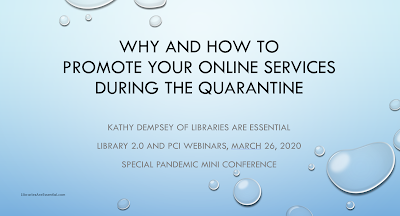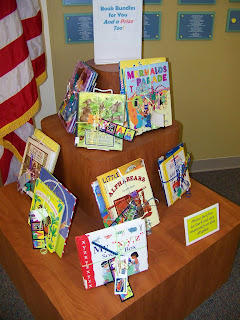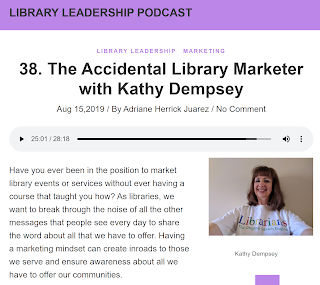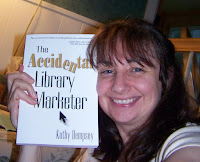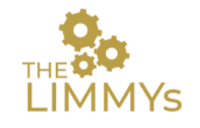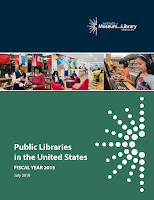May 3, 2019, marked 25 years since I was hired as editor of Marketing Library Services. That’s a big
anniversary! I was going to pen a rushed post a few weeks ago just to get it
online for the actual date, but I decided to reflect for a while first. So here
are my thoughts about being in the library marketing field over a span of 25
years.
In the Beginning …
I still remember my interviews with the president of a
library-centric publishing company in Medford, NJ, Tom Hogan, Sr. Back in 1994,
the publishing company’s name was Learned Information, and my name was Kathy
Miller. I liked the small-town and small-company atmosphere. Tom liked that I
had a journalism degree, years of editorial experience, and 5+ years as a
para-professional in academic and public libraries. Soon, I was officially on
board. Over the years, the company name changed to Information Today, Inc. and
my name changed to Kathy Dempsey.
I took on two primary jobs at Learned Information: I edited
books for that growing division, and I became the new editor of Marketing Library Services newsletter. At that time, MLS was in its 7th volume.
During my first years as editor, I oversaw changes in the
frequency and focus of the newsletter, but I won’t detail that here. The full
history is in a chapter I wrote for this book: Marketing Library and Information Services: International Perspectives,
edited on behalf of IFLA by Dinesh Gupta, Christie Koontz, Àngles Massísimo,
and Réjean Savard. (Munich: KG Saur, 2006) My invited chapter, “Marketing
Library Services Newsletter: An Overview,” covered MLS’s history from its beginnings through 2004. So that chapter
also discussed my first 10 years in library marketing.
I started this job on May 3, 1994. Back in the `90s, you
didn't often hear the words "library" and "marketing"
together. Most librarians didn't have to do much marketing or promotion because
libraries were people's main access points for information. But the internet
was a game-changer. Once the public's access to the web became widespread, and
reference transactions declined, the concept of marketing libraries slowly
became more accepted. (Although some still thought of "marketing" as
the dirty "m word.")
What’s in a Word?
Now, in 2019, fewer library employees think of “marketing”
as a dirty word, but there are still some holdouts. Over the past 5 to 8 years,
we’ve started to view the word a little differently, but still not in the way
I’d like.
It’s funny to me how people in our field have embraced
concepts like outreach and advocacy, and how they’ve gotten so wrapped up in
social media promotion. It’s funny because all of those things are parts of
marketing, but not many people or publications acknowledge that. They embrace
the pieces, but ignore the whole.
Some librarians still don’t like to think about “marketing,”
and they don’t create marketing plans, and they don’t work strategically. But
boy, they’re eager to design colorful posters, share social media memes, and
sign petitions to rally for funding. I wish they’d realize that accepting “marketing,”
doing some market research, and crafting strategic plans to organize all their
one-off efforts would make their work more effective.
All About Education
For 25 years now, I’ve been trying to educate all levels of
library workers, to move the needle in that direction. I’ve been working in
numerous ways:
- I educate professionals via MLS, by publishing case studies of great marketing initiatives,
highlighting best practices, and sharing news.
- In 2005, I started my own library marketing
consulting company called Libraries Are Essential. Organizations hire me to do marketing
consulting and training, and I’ve been speaking at conferences all over North
America.
- I also started a Facebook page for Libraries Are
Essential, intending it as a fun place for marketing info and discussions.
However, so many non-librarians followed the page (due to its name) that I
changed my strategy and made it a public-facing account. Now, every day I post
a story, photo, article, or something to showcase the goodness of libraries to
people all over the world. (Today there are nearly 5,800 followers of my LAE Facebook page.)
- Since 2008, I’ve been blogging here at The M
Word, though not as often as I should. Nancy Dowd had started this blog years
earlier and invited me to join; now she’s retired and it’s just me.
- In 2009, I published my book, The Accidental Library Marketer.
That massive undertaking allowed me to organize all the knowledge in my head
and share it with others. I hoped it would get the whole industry up to speed
on the basics of True Marketing:
doing research and segmentation, writing plans,
then working on promotion and assessment. I created my website for Libraries
Are Essential then too, where I posted my Cycle of True Marketing for everyone
to share. (I need to make time to update my site at
www.LibrariesAreEssential.com!) The book sold really well, and it’s being used
as a textbook in a handful of MLIS courses.
Sadly, that’s still not been enough to help librarians
everywhere to do excellent, strategic marketing and promotion.
Public Perception
The national situation has improved somewhat in terms of
what peers understand about marketing and what they’ve accomplished. But even
as that improves, new challenges arise.
The main challenges, the ones that keep me up at night, have
been the internet and anti-tax sentiments. The ubiquity of the internet has
given much of the public the wrong impression—that “everything” is online for
free, so nobody needs libraries anymore. In more recent years, the fiscally
conservative, anti-tax crusaders, who also believe public libraries are
unnecessary, have become proactive about voting against the levies that fund
them.
Both of these problems highlight the fact that the general
public still does not understand what
libraries are in the 21st century, and they don’t grasp the myriad benefits of
using them (and supporting them with usage and funding). OCLC’s original Perceptions of Libraries and Information Resources
report—the one that warned us that people around the globe still think of
libraries as being about books, first and foremost—came out in 2005 (pg. 3-1 / pg. 83 of the PDF).
Yet, we still haven’t succeeded in changing those
perceptions. OCLC’s follow-up report, Perceptions of Libraries, 2010: Context and Community, revealed that the library brand
was still “books” (pg. 38 / pg. 23 of the PDF). Unfortunately, the situation was even worse:
In 2005, most Americans (69%) said “books” is the first
thing that comes to mind when thinking about the library. In 2010, even more,
75%, believe that the library brand is books.
Things like this made me feel as if my 2 decades of work in
marketing had barely scratched the surface of what needed to be done. I think
it’s necessary to train more library staffers about what marketing really means
and how doing it the right way can benefit their institutions by bringing users
in, quieting the naysayers, and ensuring better funding.
The Past 5 Years
 I continued to chair LMCC in 2016 and 2017, as the event
grew in recognition and popularity. After 3 years of hard work, I stepped down
and left LMCC in the capable hands of a new nonprofit, the Library Marketing
and Communications Group. The LMC Group continues to work with Amigos Library
Services, which played a vital role in getting LMCC started. I covered our
accomplishments in this M Word post.
I continued to chair LMCC in 2016 and 2017, as the event
grew in recognition and popularity. After 3 years of hard work, I stepped down
and left LMCC in the capable hands of a new nonprofit, the Library Marketing
and Communications Group. The LMC Group continues to work with Amigos Library
Services, which played a vital role in getting LMCC started. I covered our
accomplishments in this M Word post.
The board and new chair held yet another sold-out event in
November 2018 (more than 400 attendees!). As I traveled home from that last
fall, I felt certain that LMCC was well-established, and that it will continue
for the foreseeable future. While I certainly didn’t do the work alone, I’m
incredibly proud of LMCC, and view it as my most important achievement to date—a
legacy I’m leaving for the library world.
Yet, in the midst of that success, another OCLC report
emerged. From Awareness to Funding: Voter Perceptions and Support of Public Libraries in 2018, showed us that
people’s knowledge of libraries is still sorely lacking. One of the key
findings, which appears right in the Summary Report,
says, “there continues to be a disconnect between the services libraries offer
and public awareness and support for those services.”
Again, I felt like the field hadn’t made much progress at
all. But I know it has. Colleagues consistently say that more libraries now
have people in marketing positions, even if they’re only part-time. And it
seems that libraries have been starting to hire experienced marketers for those
jobs. That’s still a debate in our field: Is it better to hire marketers / PR
people and teach them about libraries, or is it better to hire librarians and
teach them about marketing / PR? I know the learning curve can be steep either
way. But given the fact that we’re not making much headway in terms of
educating potential end users about what libraries can do for them, I
personally vote to go with marketing pros for marketing jobs. We need all the
help we can get.
So what else have I done in the most recent 5 years? With more
time on my hands after leaving LMCC, I’ve renewed my focus in two areas—writing
and speaking.
First, I’ve published more in the last few years than I have
in quite some time. The history of library marketing has been on my mind, as
I’ve been looking back to help me look ahead. I’ve been fortunate and honored
to have been invited to contribute these substantial pieces to the library
literature:
- Documentation
et Bibliothèques (a French-language journal produced in Montreal for
librarians in Canada and France). April–June 2017, v.
63, #2. Issue theme: “Marketing libraries and other information services: the
state of the art in the digital era.” My 19-page paper, “The evolution of
marketing in American libraries,” was translated to French: “L’évolution du
marketing dans les bibliothèques américaines.” Print only.
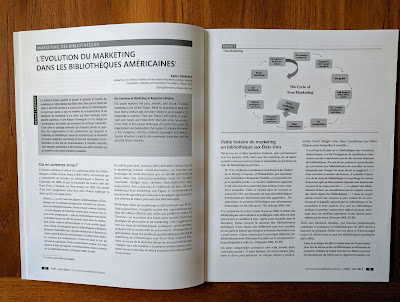
- Library and Book Trade Almanac (formerly The
Bowker Annual).
2018 edition. Based on my French paper, I penned a 14-page Special Report
titled “The State of Marketing in Libraries.” Print only.
- Information
Outlook (SLA’s magazine, full issue for members only). Sept./Oct. 2018. Issue
theme: “Communicating Your Library’s Mission.” My 3-page article is “Five
Tactics to Help You Communicate Your Mission.” Single article available here.
- Marketing
Libraries Journal (open-access, peer-reviewed, scholarly journal).
v. 3, #1, Winter 2019. Using my pieces from D
et B and LBTA as a foundation, I did
more research, rewrote in academic style, and passed double-blind peer review.
My year of work resulted in a 10,000-word paper with 50+ citations: “An Historical Overview of Marketing in U.S. Libraries: From Dana to Digital.” Online
only, free.
 The second activity I’ve been focusing on is speaking at
conferences and training events. This has been a staple for me for decades, but
the frequency has increased in the last few years.
The second activity I’ve been focusing on is speaking at
conferences and training events. This has been a staple for me for decades, but
the frequency has increased in the last few years.
One big change I’ve seen in library continuing education is
the shift from face-to-face events to online ones. While few things can beat
the energy and excitement of being in a room with 50 library peers, or in a
building with hundreds or thousands, I’ve got to say that I’ve learned to love
the simplicity of webinars. Not having to make travel plans or get on airplanes
is a big plus. Webinars make continuing education easier all around, for
organizers, speakers, and attendees, and they’re even archived for later usage.
During 2018, I think I presented 15 webinars. This year,
which isn’t even halfway over yet, I’ve already given 14, with more planned for
the fall. There are a few groups I speak for regularly, and there are always
one-time clients. This has become an efficient way to deliver training, but I
wish I could address all librarians at once. Sometimes I get tired of teaching
the same basic information.
What’s Next?
I’m still impatient about getting everyone up to speed on
marketing, promotion, PR, communication, media relations, and related topics.
Libraries’ respect and funding is still at risk across America, and in other
countries as well. So I’ll keep working.
What’s next? I’m not entirely sure yet. I do, however, have
some ideas for rebooting Marketing
Library Services to increase its usefulness and readership. I’d also like
to advocate to have marketing classes become core pieces of library-school
curricula.
Since a mere handful of MLIS-granting universities even
offer marketing as an elective, getting it taught everywhere—and making it a required
class—would be an uphill battle. But with so many people discussing “outreach,”
“branding,” “advocacy,” and those other terms under the “marketing” umbrella, I
hope The Powers That Be realize that it’s all marketing already. If they
treated it as such, and taught it consistently, all types of libraries would be
better prepared to face communication challenges, to change public perception,
and to fight for funding.

There is one thing I started doing very recently that could
have a more-immediate impact. I’ve been helping a search engine marketing
vendor called Koios spread the word about an amazing
opportunity. Google has a program that gives nonprofits $10,000/month in
advertising credit, enabling them to run campaigns that place their ads at the
top of search results. This allows librarians to advertise anything (services,
e-resources, events) for free and appear where everyone is looking. Koios helps
librarians get these Google Ad Grants and set them up with a free trial.
Afterward, a library can administer the perpetual grant on its own, or hire
Koios experts to run the campaigns. This altruistic endeavor is already helping
put libraries on equal footing with for-profit businesses, reaching the public at
their point of need.
While I and others who fight for libraries have made major
strides in the last quarter century, we still have a long way to go. Helping
librarians communicate their value to stakeholders and to potential users, and
helping libraries stay open and funded, is vital for having an educated populace
and a true democracy.
As I often say, “I’ve devoted my career to helping libraries
maintain their respect and funding.” Please join my quest!
Look for my next major update in 5 or 10 years. I intend to
have more progress to report by then.

